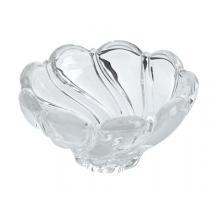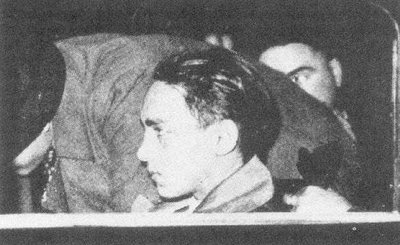Wednesday, March 29, 2006
A Crystal Candy Dish

Herschel Grynszpan is a name that probably does not ring a bell, but the events that resulted from his actions will go down in history as a key turning point in Nazi policy towards Jews and has been disputed as the spark that started the Holocaust.
Zindel Grynszpan was a Polish Jew living in Germany. Through the thirties, the Nazi Regime, which came to power in 1933, was slowly and systematically restricting the rights of German Jews. In 1935, the Nuremburg Laws where passed, which made German citizenship for Jews very difficult, if not impossible; in 1936 Jews could no longer vote in parliamentary elections; in 1938 Jews began to be deprived of economic and occupational opportunities; and on January 1st, 1939, a law was passed that required all Jews to have identification cards. If you did not have a card, you were deported. Almost 20, 000 Jews were deported to Poland and ended up in “relocation camps” along the Polish border.
Zindel Grynszpan who had a family-owned business in Hanover since 1911, was removed from his home at gunpoint by Nazis, all his possession confiscated, and deported to the Polish border. His son, Herschel, hearing of the news from France decided that he was going to take the matter into his own hands. He went to the Germany Embassy in Paris with the plan to assassinate the German Ambassador to France. He never got to the Ambassador, but he did kill a lower-ranking German official named Ernst Vom Rath.
Herschel Grynszpan

Ernst Vom Rath

Joseph Goebbels’s, the Nazi Propaganda Minister, considered the murder a fortuitous gift. He now had an excuse to order a pogrom against German Jews. Goebbels’ used the assassination to confirm his anti-Semitic beliefs that there was a international Jewish conspiracy to control the world.
On November 9 and 10, the pogrom, which would become infamously known as Kristallnacht, The Night of Broken Glass, was ordered. Nazi gangs roamed the streets breaking the windows of Jewish businesses, synagogues, and homes. It soon escalated to looting and violence. 91 Jews died, 101 synagogues were destroyed,7,500 businesses were destroyed, and 25, 000 Jews were beaten, arrested, and taken to concentration camps.
This event was the beginning of the Holocaust. It was the veritable straw that broke the camels back. Anti-Jewish policy was becoming more restrictive in the years leading up to Kristallnacht, but this event which was ordered by the Nazi government, set the stage for the unfathomable terror that we would all come to know. The passive reaction of the German citizens, in essence, gave the Nazi regime free-reign to conduct such operations. Read Goldhagen's Hitler's Willing Executioner's for a thorough and accurate account of the German culture of acceptance.
Today, my client, Ms. Glueck, shared with me some recent events that have touched her life and gave her some peace. On the first night of Kristallnacht, her father, who owned a Jewish jewelry store, was beaten, his store ransacked and destroyed, and taken to a concentration camp to die. He would never see his family again. Ms. Glueck was able to escape with her mother to France and eventually make her way to the United States in 1941. But, like all survivors, her early experiences have always been with her like a shadow.
She was able to get on with her life. She became a jewelry designer, the profession of her late-father, she got married, and she lead an intellectual and active Jewish life in New York City. In later years, she became very involved with the Leo Baeck Institute and archived the extensive photo collection of the Institute, so future generations would be able to learn about their Jewish forbears. She also organized a weekly soiree, which she titled a"Stumptisch" (German for round table). It was a loose, but dedicated group of survivors who got together to talk about their experiences, their fears, and their dreams, but, most importantly, it was a support group for Jews who were strangers in a new country.
Recently, she has been in contact with a German gentleman from Wetzlar, Germany who was doing research on his family during the war years. It turns out the gentleman found out through his mother that some of the objects that adorned his childhood home were taken from Jewish stores on the Night of Glass. His father had stolen some of the objects and brought them home. His father, like many Germans on Kristallnacht, was doing what the government silently condoned, but had surreptiously plotted. His behavior was legalized crime.
This German gentlemen felt it was his duty to make right with himself and his family. The guilt was too much for him. Through a laborious and circuitous route, he was able to connect a crystal candy dish "of not much value,"in his words, to my client Ms. Glueck. He first contacted her by letter to make sure Ms. Glueck was open to seeing a German whose family had pillaged her murdered father's store. She was. He then came with his wife to New York and handed her the crystal candy dish that for the last 66 years has been sitting on a coffee table in Germany. She cried when she held the dish. She said her father's name. She felt like she had finally reclaimed something for her dead father, the man she would give anything to talk to just one more time.
Today, the crystal candy dish sits on her table where the Stumptisch meets every Wednesday night at 8pm. They are going on 50 years together.
More on Hershel Grynszpan:
Hershel Grynszpan
The Fate of a Forgotten Assassin

